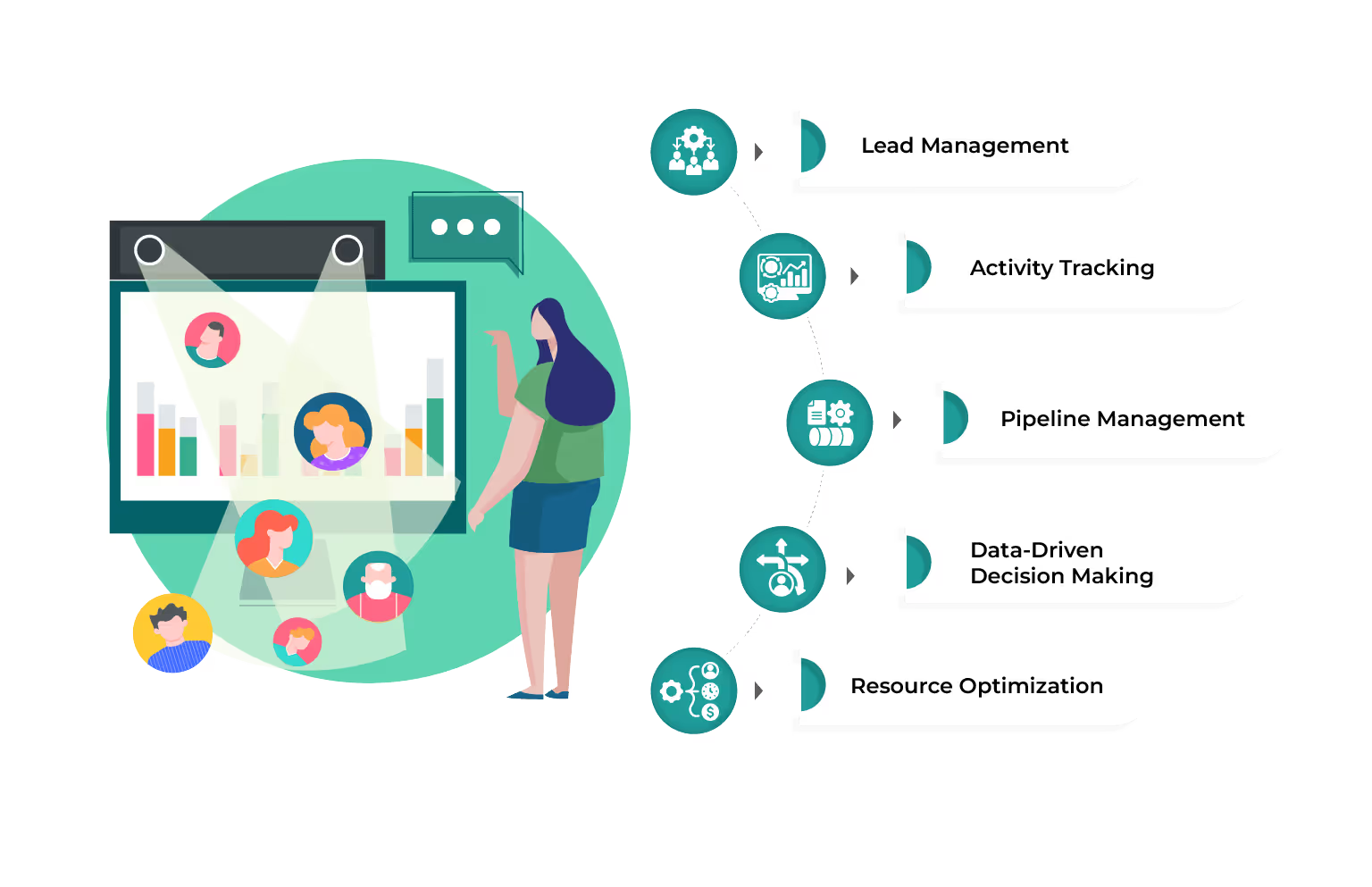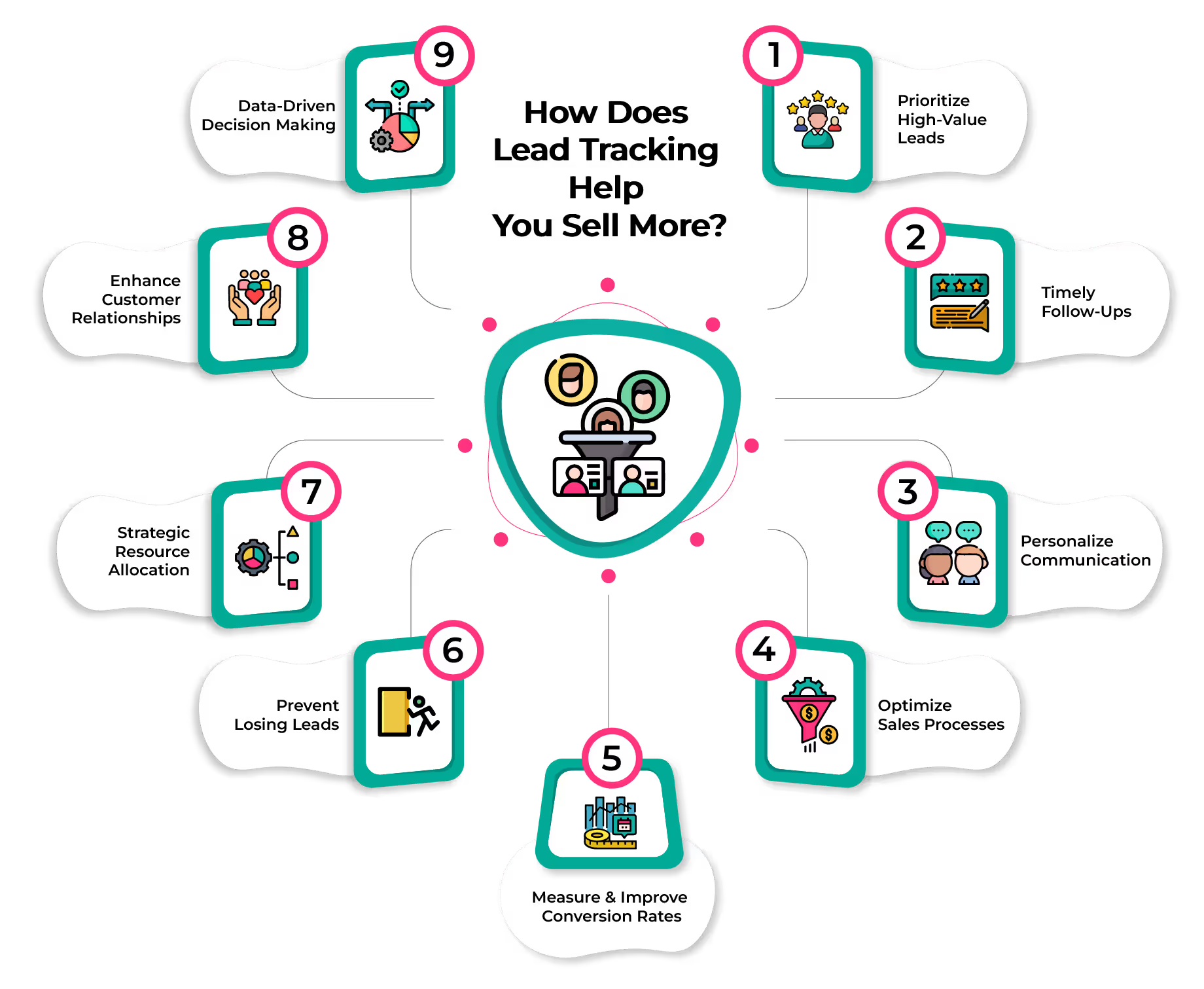Blog
How to Implement an Effective Leads Tracker System?
November 29, 2023

Key Insights
How hard can lead generation be?
According to a study, 61% of marketers find lead and traffic generation their top challenge. This means that the leads that companies generate with a lot of difficulty must be retained at all costs.
This calls for incorporating a leads tracker system to effectively monitor the lead journey through the sales pipeline.
The article will explore sales tracker, how to track leads to help your business, and how lead tracking helps sell more.
Scroll down for more.
What is a Lead Tracker?
A lead tracker is a tool used to monitor and manage potential sales leads in a business. The term "lead" typically refers to a person or organization that has expressed interest in a product or service and has the potential to become a customer.
Various types of sales leads, such as warm leads generated from marketing campaigns, cold leads from outreach efforts, and referral leads from satisfied customers, are essential considerations for businesses seeking to optimize their sales processes and convert prospects into loyal customers.
Lead tracking involves capturing information about potential customers, monitoring their interactions with the business, and organizing the data in a way that helps sales and marketing teams effectively nurture and convert leads into customers.
It contains contact information, the lead generation source, communication history, and the sales pipeline stage. This helps in optimizing sales processes and improving the efficiency of converting leads into customers.
How Can Lead Tracking Help Your Business?
Keeping track of your lead helps businesses on various levels. Let's look in detail at how lead tracking helps your business.

Lead Management
Incorporating a lead tracker helps in efficiently capturing and organizing information about potential customers. Categorizing leads based on criteria such as interest level, lead scoring, industry, or geographic location helps prioritize leads and focus on those with the highest likelihood of conversion.
Additionally, distinguishing between Salesforce leads vs contacts is crucial in managing the customer relationship effectively, as leads represent potential opportunities, while contacts signify established connections with converted prospects or existing customers within the Salesforce platform.
Activity Tracking
Lead tracker offers activity tracking which records and monitors lead interactions, including emails, calls, and website visits. This comprehensive view informs personalized communication, and timely follow-ups, and identifies buying interest. It optimizes sales processes, prevents lead oversight, and aids in strategic resource allocation, enhancing customer relationships and contributing to data-driven decision-making for more efficient sales and marketing efforts.
Pipeline Management
Lead tracker provides a visual representation of the lead journey and the sales process. This visibility into the sales pipeline and customer journey helps the sales team understand the buying interest, make decisive resource allocations, and identify areas of opportunity and improvement to enhance the conversion rate and pipeline management.
Data-Driven Decision Making
Implementing lead tracker tools helps get access to analytics and reports and gain insights into lead performance. This helps identify trends and patterns in lead behavior, performance, conversion rates, and other metrics. These valuable insights help make data-driven decisions on every aspect of lead management. Lead tracker are often used by multiple industries, such as the event industry. Where organizers keep track of their event registrations and other insights to analyze the ROI and make informed decisions.

Resource Optimization
The lead tracker aids in resource optimization by prioritizing efforts on high-potential leads. This strategic focus allows for more efficient resource allocation, ensuring a targeted approach. In addition, it facilitates the identification of areas for improvement in lead generation software and nurturing processes, refining strategies for enhanced effectiveness.
Lead tracking is a valuable practice that provides a systematic approach to managing leads, improving communication, and making informed decisions, ultimately leading to increased conversion rates and a more efficient use of resources.
For further reading, check Apply our Advanced Sales Tracker to Revolutionize Sales Management.
How Does Lead Tracking Help You Sell More?
Lead tracking is a valuable strategy that can significantly contribute to selling more effectively. Here is how lead tracking helps you sell more.
By incorporating a leads funnel strategy, businesses can streamline the sales process, guiding potential customers seamlessly from the initial point of interest to successful conversion, maximizing efficiency and boosting overall sales performance.

Prioritize High-Value Leads
Lead tracking involves lead scoring, where leads are assigned scores based on their behavior, demographics, and interactions with your business. This scoring helps sales teams prioritize warmer leads, allowing them to focus their efforts on prospects more likely to convert into customers.
In Salesforce, the platform further enhances lead management by providing customizable stages of leads in salesforce, facilitating a systematic progression through the sales pipeline and ensuring a more tailored and efficient approach to customer acquisition.
Timely Follow-Ups
Lead tracking systems help in monitoring and recording interactions with leads, such as website visits, email opens, and content downloads. This provides sales teams the information to follow up with leads at the right time, ensuring timely and relevant communication that aligns with the lead's interests and needs.
Personalize Communication
With a lead tracker template, sales teams can access a comprehensive view of a lead's history and preferences. This helps sales representatives tailor their communication to address specific pain points or interests and thereby personalize communication, build rapport, and increase the chances of converting a lead into a customer.
Optimize Sales Processes
Sales tracker visualizes the sales pipeline and analyzes the data collected. This helps to identify bottlenecks and areas for improvement in your sales processes, including the optimization of sales cadence. Optimizing these processes ensures a smoother journey for leads through the sales funnel, reducing the likelihood of drop-offs.
By incorporating a leads pipeline, businesses can systematically manage and track the progression of potential customers, providing valuable insights for refining strategies and enhancing overall sales efficiency.
Measure and Improve Conversion Rates
Lead tracking provides insights into conversion rates at different stages of the sales funnel. Measuring the lead progress helps gain valuable insights and analyzing the data helps in understanding which strategies and tactics are most effective in converting leads. This regular monitoring and feedback helps in the continuous improvement of the sales process.
Prevent Losing Leads
The visualization offered by lead tracking systems helps prevent leads from being overlooked or forgotten. The tool provides automated reminders and notifications to ensure that sales teams follow up with leads promptly, personalize communication, and reduce the chances of losing potential customers.
Strategic Resource Allocation
Lead tracking helps in identifying high-quality leads, strategically allocating resources, and thereby yielding positive results. This timely and focused investment of resources ensures return on investment, optimizes pipeline management, enhances conversion rate, and ensures faster closing of deals.
Enhance Customer Relationships
Knowing your lead stage, their interest rate, and their chances of conversion helps in personalizing the customer interaction and thereby ensuring higher chances of conversion. This personalized approach of identifying the customer challenge and addressing the problem through your product helps in building a long-lasting relationship that opens future opportunities for upselling and cross-selling.
Data-Driven Decision Making
The advantage data provides in today's business operations is immense. Lead tracking tools provide data and analytics to the sales teams to make informed decisions about their strategies, messaging, and targeting. This strategic approach towards the sales process ensures accuracy in the decisions made and enhances the chances of success.
Lead tracking empowers sales teams with valuable insights, enabling them to focus on the right leads, engage in timely and personalized communication, and continuously optimize their processes for better results.
For further reading, check What is Lead Funnel and How to Build One For Your Business.
Final Thought
Lately, organizations have increasingly started incorporating tools to optimize and boost operations. It eases everyday routine tasks and ensures its effectiveness through visibility and automation.
Lead Tracker tools streamline the customer journey by providing visibility into the lead journey, providing valuable data and insights on the pipeline, ensuring strategic decision-making, and personalized communication and thereby consistently optimizing the sales process.
Automating tools streamline everyday operations and optimize them thereby enhancing the accuracy of the desired results and ensuring efficiency.
Build, run, and automate your incentive compensation plans to create transparency and achieve operational efficiency with Kennect. For more information, Book A Demo NOW!
ReKennect : Stay ahead of the curve!
Subscribe to our bi-weekly newsletter packed with latest trends and insights on incentives.
Thank you! Your submission has been received!
Oops! Something went wrong while submitting the form.
Your data is in safe hands. Check out our Privacy policy for more info














